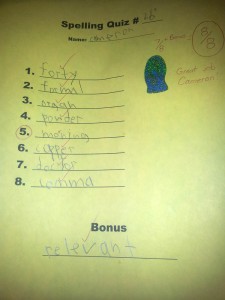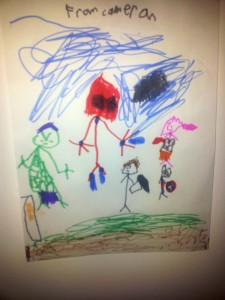Cameron has started this year in a new, more academic class than last year. Up until now, he’s been learning a lot but the primary focus as been on building upon the things that he’s been struggling with. Things like his fine motor skills and socializing.
This year, he’s doing math and spelling tests. He’s also learning about mammals, reptiles and amphibians. It’s exciting stuff! And he’s loving every minute of it!
Well, almost every minute.
While working with him at home, I have him write out his spelling words for two reasons… one is so that he can learn them and do well on his spelling test but also, so that he can practice his penmanship.
My wife, Natalie, brought up an interesting point though, one that we’ve now mentioned to the school.
Cameron has a terrible time with his writing. He doesn’t like writing and he knows he’s not good at it. And it weighs on his mind.
Looking back at some of his spelling tests, the words that he got wrong or the mistakes he made were words and mistakes that he shouldn’t have gotten wrong.
For example, in almost all of his spelling mistakes, it’s due to him missing a letter. Not getting a letter wrong or mixing them up, he is leaving out entire letters.
Natalie is the one that realized that, he’s not getting the words wrong because he doesn’t know how to spell them (or sound them out), it’s because his mind isn’t on the word… it’s on his writing.
He knows that his writing doesn’t look good and he knows that he has to fit the answers in a little space on the page. So he puts in extra effort to be sure that the teacher can read it and that it looks ok… because, you know… you don’t want anyone to laugh at your writing. Yes, he worries about that.
So I brought it up with the principle yesterday and if all goes well, hopefully testing can be done, or at least made available, electronically. So that if a student prefers, they can type their answers, either at a computer or some device with a touch screen.
And we’re lucky. We’re so very lucky that this school is so understanding. As I brought it up, I could see the principle understanding exactly what I meant. When I said “when a child with autism starts to get flustered… ” he finished my sentence with “their whole day could be shot after that.”
Yes!!
Do I want them to stop working on his writing and fine motor skills? No, of course not!!
But I don’t want those challenges to get in the way of other things either. He knows those words. He knows the answers to the tests. And his anxiety over his writing skills should not be getting in the way of that.
The reason that I’m writing about this, is not just to illustrate what’s happening in Cameron’s life at the moment (although there is that too), it’s to provide an example where sometimes you have to be involved, be aware and when possible, find another way.
Parents, you need to recognize these things in your children. Perhaps they are being held back by something that no one else would ever be able to recognize. Perhaps there is some other way that may work well for your child. And most importantly, you have to try to provide some solutions.
Granted, as I said, we’re lucky. My son’s school is awesome. And not everyone has a school like his. Not all schools can or are able to accommodate a change like that.
But that doesn’t mean that you shouldn’t try.
If something isn’t working, or could be working better, you have to try to find another way.
Nothing can stop you, so long as you never stop trying to find another way.













